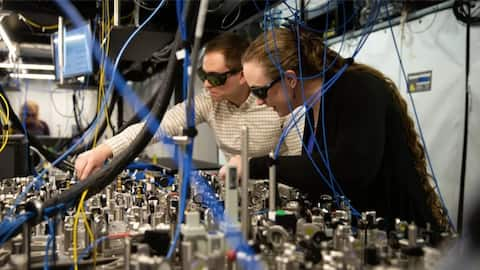Microsoft claims of developing the most error-free quantum computer yet
What's the story
Microsoft and Quantinuum, a quantum computing company, have announced a significant development in the field of quantum computing, claiming to have created the most accurate system to date. Their method reduced errors by 800 times. This was achieved by using virtual qubits, which is a novel approach in quantum computing. Experts believe this is a promising development that could pave the way for practical quantum computers, which can perform complex calculations significantly faster than traditional computers.
Quantum basics
Understanding quantum computing and its challenges
Quantum computers operate using qubits (quantum bits), which can exist in two states simultaneously, unlike traditional computers that rely on binary bits. The main challenge with qubits is their susceptibility to errors, limiting the use of current quantum computers to research and experimentation. This error-proneness has been a significant barrier to the practical application of quantum computing technology.
Error reduction
Innovative approach to quantum computing
Microsoft's strategy involved grouping physical qubits into virtual ones, enabling error detection and correction without harming the qubits. This system was tested on Quantinuum's hardware, resulting in an error rate 800 times lower than when using physical qubits alone. Over 14,000 experiments were conducted by Microsoft without any errors, marking a significant step forward in quantum computing technology.
Future prospects
Toward practical quantum computing applications
Jason Zander, EVP of Microsoft's Strategic Missions and Technologies division, stated that this achievement could lead to "Level 2 Resilient" quantum computing, reliable enough for practical applications. He emphasized the need to increase qubit fidelity and enable fault-tolerant quantum computing to solve previously intractable problems. MIT physics professor Aram Harrow called Microsoft's announcement a "strong result," praising the Quantinuum system's impressive error rates and control.
Upcoming access
Microsoft's system will be accessible to researchers soon
Microsoft plans to offer researchers access to its reliable quantum computing system via Azure Quantum Elements in the coming months, where it will be available as a private preview. The ultimate goal is to advance to Level 3 quantum supercomputing, which could theoretically tackle complex issues such as climate change and advanced drug research. However, the timeline for reaching this stage remains uncertain.
